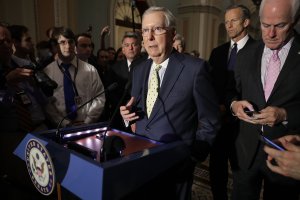Senate Majority Leader Mitch McConnell might be on the verge of releasing a bill to repeal Obamacare, but he’s got conservatives to convince before he can be sure he has the votes to pass it.

On Tuesday, McConnell announced there would be a “discussion draft” unveiled Thursday on health care, but some in the right flank of his conference are already voicing skepticism for what’s coming.
“I think they’ve forgotten all the rallies where we said we’re going to repeal it. We had thousands of people standing up and cheering us on, saying we’re going to repeal it and now they’ve gotten pretty weak-kneed and I think they want to keep it,” Sen. Rand Paul, a Kentucky Republican, told reporters Tuesday. “Conservatives who are in the know are going to know that this isn’t repeal.”
Most members haven’t seen legislative texts of the bill, but the process itself has been deeply frustrating for some of the conservatives who McConnell may need to convince to pass his bill.
Tuesday afternoon Republican Sen. Mike Lee of Utah took to Facebook Live to tell constituents, “if you’re frustrated by the lack of transparency in this process, I share your frustration. I share it wholeheartedly.”
“It’s not being written by us,” Lee said, noting he was a member of the so-called working group. “It’s apparently being written by a small handful of staffers for members of the Republican leadership in the Senate.”
On policy, Paul has raised problems with voting for anything that included robust tax credits to help people buy insurance. And conservatives both on and off the Hill warn that they won’t support any bill that doesn’t lower premiums. Conservatives believe that in order to do that, Senate Republicans need to repeal many of the Obamacare regulations including community rating, which bars insurers from charging people with pre-existing conditions more for their health care coverage. The problem is that Senate leaders have been clear with the conference that they prefer not to repeal the community rating provision.
Sen. Ted Cruz, a conservative member of the Senate’s working group, said Tuesday — just days before a bill is expected to be released — that the Senate was “nowhere near resolving the issues that are needed.”
“It depends what’s in the bill,” Cruz said when asked if he could support it. “There are many issues that are active topics of discussion. We are making steady progress, but we’re nowhere near resolving the issues that are needed. The most important issue is we have to drive down the cost of premiums. We have to make health insurance more affordable for families who are struggling. That is my number one priority.”
Across Capitol Hill, House conservatives are also growing a bit nervous with the lack of clarity on what’s about to come out of the Senate.
House Freedom Caucus Chairman Mark Meadows told CNN Tuesday in a phone call that he continues to have discussions with senators, but that no one seems to know what’s about to be released.
“I think there is a whole lot of ambiguity, which gives everyone some concern that there isn’t enough time to review,” Meadows said. “We have articulated some of the have-tos and nice to haves on multiple occasions with a variety of senators.”
McConnell can only lose two Republican senators — any more than that and Senate leaders will fail to repeal Obamacare. That means McConnell can’t afford to lose all three of his most conservative members. And conservatives are just part of the problem.
Moderates also have deep concerns about what McConnell is about to release. Senators from Medicaid expansion states senators have been especially vocal against reports that Senate leaders may change the growth rate of Medicaid to standard inflation after 2025. That would put a significantly larger burden on states to finance their Medicaid programs.















